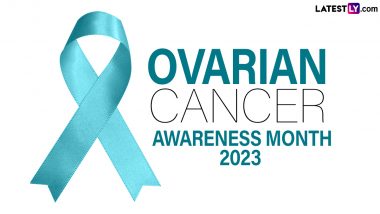Ovarian Cancer Awareness Month, observed in September, serves as a poignant reminder of the importance of raising awareness about ovarian cancer, its early detection and supporting those affected by this disease. Let's explore the significance and history of Ovarian Cancer Awareness Month. PTSD Linked to Increased Risk of Ovarian Cancer.
Ovarian Cancer Awareness Month Significance
Ovarian Cancer Awareness Month is significant in spotlighting a type of cancer that affects the ovaries, a vital part of the female reproductive system. The month-long campaign aims to educate individuals about the risk factors, symptoms, and early detection methods associated with ovarian cancer. It also underscores the importance of supporting individuals diagnosed with ovarian cancer and their families. Gynecologic Cancer Awareness Month 2023 History and Significance: Everything You Need To Know About Cancer That Starts in Woman's Reproductive Organs.
History of Ovarian Cancer Awareness Month
The genesis of Ovarian Cancer Awareness Month can be traced back to the early 1990s when various ovarian cancer advocacy groups and healthcare organizations recognized the urgent need to raise awareness about this often silent and deadly disease. These groups joined forces to designate September as Ovarian Cancer Awareness Month. Since then, the month has become a platform for sharing information, hosting events, and promoting early detection strategies.
What is Ovarian Cancer?
Ovarian cancer is a type of cancer that originates in the ovaries, the female reproductive organs responsible for producing eggs and hormones. Ovarian cancer often goes undetected in its early stages, leading to a higher mortality rate compared to other cancers. It is crucial to be aware of the risk factors, symptoms, and early detection methods associated with ovarian cancer.
Ovarian Cancer Risk Factors
Several factors may increase the risk of developing ovarian cancer, including:
- Age: The risk increases with age, particularly after menopause.
- Family History: A family history of ovarian, breast, or colorectal cancer may
- Personal History: A history of breast, colorectal, or endometrial cancer can increase the risk.
- Reproductive History: Factors like never having been pregnant or having a late menopause can increase risk.
Ovarian Cancer Symptoms
Ovarian cancer is often referred to as the "silent killer" because its symptoms can be vague and easily overlooked. Common symptoms include:
- Abdominal bloating or swelling
- Pelvic pain or discomfort
- Feeling full quickly while eating
- Changes in bowel or urinary habits
- Fatigue
- Back pain
Early Detection
Early detection of ovarian cancer can significantly improve outcomes. If you experience persistent or unusual symptoms, especially if they are new and persistent, consult a healthcare professional. Regular pelvic examinations and imaging tests may aid in early detection, especially for those at higher risk.
In conclusion, Ovarian Cancer Awareness Month finds an important place in the medical community at large. By educating individuals about the risks, symptoms, and early detection methods of ovarian cancer, this awareness month serves as a beacon of hope in the fight against this disease. We must raise awareness, support survivors, and work towards improved outcomes for ovarian cancer patients and their families.
(The above story first appeared on LatestLY on Sep 03, 2023 11:25 PM IST. For more news and updates on politics, world, sports, entertainment and lifestyle, log on to our website latestly.com).













 Quickly
Quickly





















